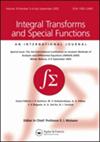零与d -正交的关系
IF 0.7
3区 数学
Q2 MATHEMATICS
引用次数: 0
摘要
[摘要]K. Driver研究了给定多项式序列的正交性与零的交错性之间的联系。在本文中,我们尝试将这个结果推广到d-正交多项式的一些特殊情况。实际上,首先,我们刻画了给定序列{Pn}n≥0的2正交性,并且存在一个用Pn的零点表示的比值cn。然后,对于(d+1)叠对称多项式{Pn}n≥0,使得Pn有qn个不同的正实零,n=(d+1)qn+j,j=0,…,d,研究了这些零的交错、d正交性与比值cn的正性之间的联系。最后,给出了给定序列{Pn}n≥0的零点满足特定(d+1)阶递归关系的充分必要条件。文中给出了许多实例来说明所得结果。关键词:(d+1)-折叠对称多项式;烧结性质-正交多项式;多项式的递归关系;sams分类::42C0533C45致谢感谢匿名审稿人提出的有益意见和建议,提高了论文的质量。披露声明作者未报告潜在的利益冲突。本文章由计算机程序翻译,如有差异,请以英文原文为准。
On connection between zeros and d -orthogonality
AbstractConnection between the interlacing of the zeros and the orthogonality of a given sequence of polynomials is done by K. Driver. In this paper, we attempt to extend this result to some particular cases of d-orthogonal polynomials. In fact, first, we characterize the 2-orthogonality of a given sequence {Pn}n≥0, with the existence of a certain ratio cn expressed by means of the zeros of Pn. Then, for the (d+1)-fold symmetric polynomials, {Pn}n≥0, such that Pn has qn distinct positive real zeros, n=(d+1)qn+j,j=0,…,d, we study the connection between the interlacing of these zeros, the d-orthogonality and the positivity of the ratio cn. Finally, we give necessary and sufficient conditions on the zeros of a given sequence {Pn}n≥0, that will assure that this sequence satisfies a particular (d+1)-order recurrence relation. Many examples to illustrate the obtained results are given.KEYWORDS: (d+1)-Fold symmetric polynomialsinterlacing propertyd-orthogonal polynomialsrecurrence relationzeros of polynomialsAMS CLASSIFICATION:: 42C0533C45 AcknowledgmentsThe authors thank the anonymous referees for their helpful comments and suggestions that improved the quality of the manuscript.Disclosure statementNo potential conflict of interest was reported by the author(s).
求助全文
通过发布文献求助,成功后即可免费获取论文全文。
去求助
来源期刊
CiteScore
2.20
自引率
20.00%
发文量
49
审稿时长
6-12 weeks
期刊介绍:
Integral Transforms and Special Functions belongs to the basic subjects of mathematical analysis, the theory of differential and integral equations, approximation theory, and to many other areas of pure and applied mathematics. Although centuries old, these subjects are under intense development, for use in pure and applied mathematics, physics, engineering and computer science. This stimulates continuous interest for researchers in these fields. The aim of Integral Transforms and Special Functions is to foster further growth by providing a means for the publication of important research on all aspects of the subjects.

 求助内容:
求助内容: 应助结果提醒方式:
应助结果提醒方式:


